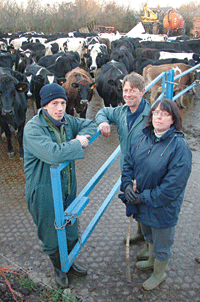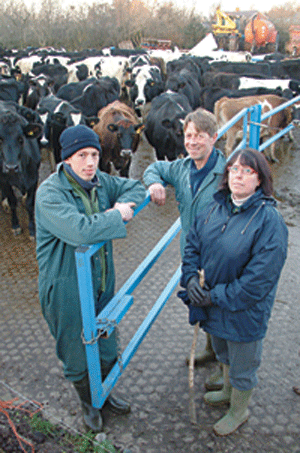No standing still for a forthright farmer

- Mike Allwood, Burland Farm, near Nantwich, Cheshire.
- Livestock Farmer Focus contributor, 1997-1998
Mike Allwood retains the forthright views and strong belief in how he farms that he brought to the pages of Farmers Weekly more than 10 years ago.
A decade back, conversion to organic production had been driven by the strong desire to farm with the environment in mind, rather than simply chasing the premium offered by the emerging organic market.
And despite the highs and lows of price fluctuation for organic milk in recent years that undoubtedly put pressure on cash flow, the ethos remains unchanged. “It’s still a difficult concept for the consumer to understand certainly a lot easier to buy in to than sell,” he remarks.
But it’s the response from other farmers that still rankles. “Just because you do something differently others think you’re sniping at them. I’m not. I believe in farming with as little impact on the environment as possible. In my mind there two types of farm – organic and chemical.”
Learning to do without some inputs has been an enjoyable, if challenging, process. The farm avoids most hikes in fertiliser costs by using farm-yard manure, albeit with a reliance on buying in straw to bed up cows. Regulations like Integrated Pollution Prevention and Control rules and the forthcoming NVZ legislation will still have a huge impact on the business, but the organic ethos to use resources effectively must help with planning.

Management has seen the expanding herd follow a grazing system using some New Zealand principles adapted to suit UK dairying developed by Mr Allwood. His strategy is based on tight spring calving and good pasture management building up a wedge of grass in front of cows. “Weed control has not been as tough as some may imagine but understanding rules for withdrawal periods for milk (where antibiotic use was unavoidable) has been taxing.”
There have been other issue to tackle. “We stopped manufacturing cheese several years ago and sold the business to Butlers Farmhouse Cheese which still operates from here, but using bought-in supplies,” he says.
Capital and management time have been ploughed into concentrating on the business of producing the white stuff. Wife Sandra still plays a key role, now managing the farm accounts, while son Josh, 28, is back from university and taking a greater role in running the farm. “Our daughter Fran, also a graduate, in now also back close to home.”
Nothing stands still and Mr Allwood has been active preparing an exit strategy. “Josh now has family and is very capable. I’m sure he’ll want me out the big house soon, so Sandra and I have purchased a smallholding in North Wales.”
There he’ll be far enough away to avoid interfering but close enough to assist if needed. “It’ll allow us to do subsistence farming and I hope to have more time for rowing something I’ve been very active at with the local Grosvenor Club on the nearby River Dee for a number of years.”
And what of future challenges? “For the farm as a whole I think we’ve gone down the right route not only for us personally but for farming consideration of the environment is important. The future’s got to be bright with a growing population I can only see the need for more farmers.”
10 years ago
- 170-cow dairy farm
- Organic conversion
- Making own cheese
- Organic farm shop
Now
- 300-cow organic herd
- Milk sold wholesale
- Next generation steps in
- Retirement plans begun
Read how the Lee family have adapted their business
